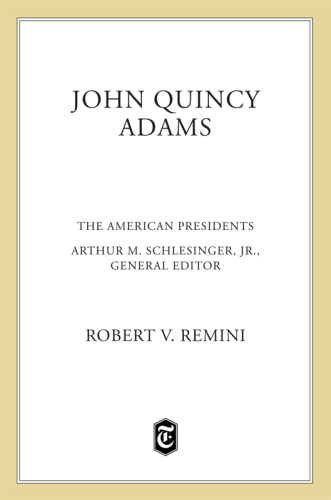
John Quincy Adams
The American Presidents Series: The 6th President, 1825-1829
فرمت کتاب
ebook
تاریخ انتشار
2014
نویسنده
Arthur M. Schlesinger, Jr.ناشر
Henry Holt and Co.شابک
9781466871861
کتاب های مرتبط
- اطلاعات
- نقد و بررسی
- دیدگاه کاربران
نقد و بررسی

June 10, 2002
John and Abigail Adams's son was arguably the most brilliant man ever to occupy the White House. He was also probably the least temperamentally fit to do so. Nevertheless, as this straightforward biography reminds us, John Quincy Adams (1767– 1848) led one of the longest, most illustrious and most consequential public careers in the nation's history. Remini, the great modern biographer of Andrew Jackson, might seem the wrong choice to write a life of one of Jackson's most implacable enemies. But in this addition to a series on the presidents edited by Arthur M. Schlesinger Jr., Remini, a National Book Award winner, paints an admiring portrait of an extraordinary man. Depicting Adams as deficient husband and father and disputably holding his famous parents largely responsible for the torments in all their children's lives, Remini concentrates on Adams's 50-year public career, much of it spent abroad. Remini is surely justified in holding Adams out as the nation's greatest secretary of state, largely responsible for what we know as the Monroe Doctrine. Although Adams as president was out of touch with most of his fellow citizens, it's likely that no one could have succeeded in the White House given the political confusion of those years. Adams's post–White House years (he was one of only two ex-presidents to return to Congress) yielded some of his life's greatest triumphs. He laid the basis for the Free Soil movement that eventually helped defeat slavery, protected the bequest that gave us the Smithsonian Institution and, as many readers will know from the film, defended the Amistad
slaves. No one who reads this fine, short study will fail to place Adams in the pantheon of Great Neglected Americans—which is just what Remini hopes to achieve and does.

August 12, 2002
Remini, the author of many books on Andrew Jackson, Henry Clay, and the politics of the 1820s and 1830s, here offers a brief biography of the sixth president of the United States as part of the American Presidents series edited by Arthur M. Schlesinger Jr. John Quincy Adams's four-year presidency was the least satisfying period in a long public career. He served as diplomat and Secretary of State prior to his election and became the only former president to sit in the House of Representatives, where he remained for 17 years during the increasingly stormy sectional debate. Remini focuses on important incidents throughout Adams's life, demonstrating that he was not the failure he would have been if judged only by his presidential years. Adams has been the subject of two recent longer biographies: Paul Nagel's John Quincy Adams: A Public Life and Lynn Hudson Parsons's capable but generally overlooked John Quincy Adams. Though the book is brief, in keeping with the series, Remini still manages to stay true to his scholarly credentials while targeting a general audience. Some endnotes are included that do not interrupt the flow of each chapter. Recommended for major public or academic libraries. Charles K. Piehl, Minnesota State Univ., Mankato
Copyright 2002 Library Journal, LLC Used with permission.

Starred review from July 1, 2002
The latest gem in Holt's American Presidents series is written by a widely acclaimed specialist in early-nineteenth-century American history and the author of such well-received biographies as " Henry Clay: " " Statesman for the Union "(1991). His judicious, eloquent survey of the sixth president's life and career intends not to proffer new and explosive ideas but to fashion recent scholarship into a highly readable overview for the general reader. John Quincy was the son, of course, of the second president, and he benefited from his father's political and diplomatic career, which exposed him to the wider world beyond his native Massachusetts. (But John Quincy could never live up to the unrealistic standards imposed by his controlling mother, Abigail.) Mature for his age, young John Quincy entered into the diplomatic corps, and eventually President Monroe appointed him secretary of state, the greatest figure to occupy that office, so Remini avers. As president, though, John Quincy was a disaster. He was unable to develop political adroitness, always "exud[ing] the air of a scholar, not a leader." Nonetheless, Remini concludes that despite John Quincy's lack of success as president, "everything else in his public life added distinction to [America's] illustrious history."(Reprinted with permission of Booklist, copyright 2002, American Library Association.)

























دیدگاه کاربران